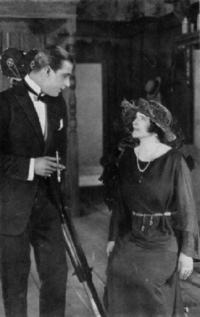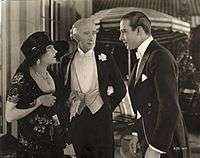Beyond the Rocks (film)
Beyond the Rocks is a 1922 American silent romantic drama film directed by Sam Wood, starring Rudolph Valentino and Gloria Swanson. It is based on the 1906 novel of the same name by Elinor Glyn.[1] Beyond the Rocks was long considered lost but a nitrate print of the film was discovered in the Netherlands in 2003. The film was restored and released on DVD by Milestone Film & Video in 2006.
| Beyond the Rocks | |
|---|---|
 Poster for the film. | |
| Directed by | Sam Wood |
| Produced by | Jesse L. Lasky |
| Written by | Jack Cunningham (scenario) |
| Based on | Beyond the Rocks: A Love Story by Elinor Glyn |
| Starring | Rudolph Valentino Gloria Swanson |
| Cinematography | Alfred Gilks |
Production company | |
| Distributed by | Paramount Pictures |
Release date |
|
Running time | 80 minutes (2005 alternate version) 76 minutes (DVD edition) |
| Country | United States |
| Language | Silent |
_2.jpg)
Plot

Captain Fitzgerald (Alec B. Francis), a retired guardsman on a modest pension, has to support three daughters: Theodora (Swanson) and her older half-sisters. Theodora's sisters pin their hopes on her marrying a wealthy man.
One day, Theodora goes out on a rowboat off the coast of Dorset and falls into the water. She is rescued by Lord Hector Bracondale (Valentino). He is young, handsome and wealthy, but "not the marrying kind". Out of a sense of duty to her beloved father, she reluctantly agrees to wed the middle-aged, short, stout Josiah Brown (Robert Bolder), a former grocer's assistant who is now a multi-millionaire.
They honeymoon in the Alps. By coincidence, Bracondale stops at the same inn. Rich American widow Jane McBride (Mabel Van Buren) persuades the young bride to accompany her on a climbing excursion. Theodora slips and dangles precariously by her safety line over a cliff. Bracondale appears and climbs down to her, but they are too heavy for the others to pull up. Bracondale has them lower him and Theodora to a ledge below. While they wait for more help to arrive, Theodora tells Bracondale (who does not initially recognize her) where they last met.
They meet a third time in Paris, and finally acknowledge their love for each other. However, Theodora refuses to run away with Bracondale.
Bracondale strives to do the right thing. He asks his sister, Lady Anningford (June Elvidge), to befriend Theodora. Lady Anningford invites the Browns to her country estate. Bracondale, however, cannot stay away. He tries once again to persuade Theodora to change her mind, without success. Meanwhile, Josiah is persuaded by another guest, renowned explorer Sir Lionel Grey, to fund his dangerous expedition. Bracondale leaves, and Josiah is called away on business. Theodora writes a letter to each; to Bracondale, she declares her love, but stresses once more that it cannot be fulfilled. Morella Winmarleigh (Gertrude Astor), who desires Bracondale for herself, secretly opens the letters and, after perusing them, switches them.
After Bracondale reads the message meant for Josiah, he rushes to stop Josiah from reading his, but is too late. Josiah accuses Bracondale of stealing his wife, but the nobleman denies that Theodora has been unfaithful.
After further consideration, Josiah decides to put his wife's happiness ahead of his own and joins Grey's expedition to Northern Africa. His death makes it possible for the young lovers to be together.
Differences from the book
While the book mostly takes place at dinner parties, picnics and balls, the film version changes many of the events to take place during perilous outdoor sports. Relatedly, the book's Bracondale never saves Theodora's life, as there is no particular danger for her to get into. Josiah in the book is chronically ill and dies after a long period of health problems; in the film he dies relatively quickly in a hunting accident. The film also has added historical sequences, inspired by Cecil B. DeMille's work.[2] Director Sam Wood had been an assistant director for DeMille.
Cast

- Rudolph Valentino as Lord Hector Bracondale
- Gloria Swanson as Theodora Fitzgerald
- Edythe Chapman as Lady Bracondale, Hector's mother
- Alec B. Francis as Captain Fitzgerald
- Robert Bolder as Josiah Brown
- Gertrude Astor as Morella Winmarleigh
- June Elvidge as Lady Anna Anningford
- Mabel Van Buren as Jane McBride
- Helen Dunbar as Lady Ada Fitzgerald
- Raymond Brathwayt as Sir Patrick Fitzgerald
- Frank Butler as Lord Wensleydon (as F. R. Butler)
- Gino Corrado as Guest at Alpine Inn (uncredited)
Preservation status
Beyond the Rocks was considered a lost film. In the last years of her life Gloria Swanson professed a desire to see Beyond the Rocks, but the film was unavailable and considered lost at the time, save for a one-minute portion for the better part of the twentieth century until a print was found in the Netherlands in 2003.[3] Gloria Swanson died in 1983.
The film was restored by the Nederlands Filmmuseum and the Haghefilm Conservation. It turned up among about two thousand rusty film canisters donated by an eccentric Dutch collector, Joop van Liempd of Haarlem. It was given its first modern screening in 2005.[4]
The restored version was released on DVD in 2006.[5]
Gallery
 Theodora Fitzgerald and her father Captain Fitzgerald (played by Gloria Swanson and Alec B. Francis) talk to Lord Hector Bracondale (Rudolf Valentino) in Beyond the Rocks
Theodora Fitzgerald and her father Captain Fitzgerald (played by Gloria Swanson and Alec B. Francis) talk to Lord Hector Bracondale (Rudolf Valentino) in Beyond the Rocks_-_4.jpg)
See also
References
- "Progressive Silent Film List: Beyond the Rocks". Silent Era. Retrieved July 5, 2009.
- "Beyond the Rocks | Silent Film Festival". www.silentfilm.org. Archived from the original on September 18, 2017. Retrieved July 27, 2015.
- Carrell, Severin (April 18, 2004). "Lost Swanson and Valentino classic is found". The Independent On Sunday. Archived from the original on November 4, 2012. Retrieved April 5, 2008.
- "Progressive Silent Film List: Beyond the Rocks (1922) Recovered". Silent Era. Retrieved July 5, 2009.
- Kehr, Dave (January 11, 2006). "New DVDs: 'Beyond the Rocks'". New York Times. Retrieved May 4, 2008.
External links
| Wikimedia Commons has media related to Beyond the Rocks (1922 film). |
- Beyond the Rocks on IMDb
- Beyond the Rocks at the TCM Movie Database
- The AFI Catalog of Feature Films:Beyond the Rocks (Joop's print viewed)
- Beyond the Rocks at AllMovie